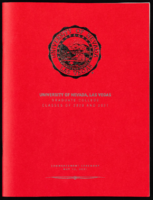Search the Special Collections and Archives Portal
Search Results

Transcript of interview with Dorothy George by Claytee White, October 13, 2003
Date
Archival Collection
Description
After serving as a nurse in World War II in Hawaii, Okinawa and Japan, Dorothy returned home to Chippewa Falls, Wisconsin. She experienced a particularly bad winter and she set out for California but stopped in Las Vegas to visit the family of her traveling companion, a girlfriend from her home town. The girlfriend returned to Wisconsin and George applied for a nursing license and got it within three days. She never left. Dorothy met her husband while working the night shift at Clark County Hospital. He would come in regularly to assist his patients in the births of their babies. Their occupations and their service in World War II drew them together in a marriage that has lasted over fifty years. From 1949 to this interview in 2003, Dorothy George has seen Las Vegas grow from a town that she loved to a metropolitan area that is no longer as friendly. She reminisces about the Heldorado parades, family picnics at Mount Charleston, watching the cloud formed by the atomic bomb tests, raising six successful children, leading a Girl Scout Troop, and working in organizations to improve the social and civic life of Las Vegas.
Text

Transcript of interview with Edward "Ed" Butera by Stefani Evans and Claytee White, July 28, 2016
Date
Archival Collection
Description
Engineer Edward "Ed" Butera spent hours constructing models from the time he was a five-year-old boy in San Jose, California. Besides his interest in building and design, the young Butera also loved math and music—specifically the clarinet, at which he excelled, and which he still enjoys. After earning his Bachelor’s degree in Electrical Engineering at San Jose State University he was hired by Ralph Joeckel as a consulting engineer for Trane, a heating and air conditioning company. Joeckel became a mentor and "second dad" to Butera after the company sent him to Las Vegas in 1972, and the two remain close to this day. In this interview, Butera shares how he engineered and designed power, water, sanitation, utilities, and heating and cooling systems on many Clark County high schools, hospitals, and data centers while considering such factors as the building's shape and its affect on the way wind forces act on its glass, windows, and doors. He talks of his casino work that began with the Stardust soon after he arrived in Las Vegas, and before his client list grew to include Tony Marnell, Steve Wynn, and MGM. Besides the hotels, he shares his experiences engineering the infrastructure for the Bellagio fountains, The Mirage volcano, Treasure Island's pirate show.
Text

Transcript of interview with Walter Weiss by Claytee White, November 2, 2010
Date
Archival Collection
Description
In this interview, Walter Weiss discusses how Judaism and boxing kept him out of trouble in his youth. Weiss grew up in the Boston area, and started boxing as a teenager. Weiss talks about his boxing training, becoming a runner for a bookmaker, and coming to Las Vegas in the 1950s to be a bookmaker for the Stardust Hotel, and working the slot machine floor. He had several different jobs in various casinos, and discusses different people involved in the gaming industry in Las Vegas.
Walter Weiss life story begins in a Malden, Massachusetts during the Great Depression. His early background was a blend of observant Judaism, secularism, and the effects of the era. He was a troubled youth whose older brother encouraged him to join him in boxing. As Walter explains: I was a wild kid and ... boxing saved my life. His aptitude for boxing led him to be a sparring partner in New York City's famous Spillman Gym. There he met and worked out with some of the greatest fighters of the era, including Rocky Marciano. He recalls how he turned professional while attending the University of Miami and how he first came to Las Vegas in 1958 to escape his personal troubles and find work with a local bookmaker. Thus began his diverse employment history in the casino industry. He details his various positions and the cast of famous and infamous characters of the times. For six years he return to New York and worked as a Wall Street broker before arriving back in Las Vegas in 1973. He talks about his property ownership, lobbying for an amendment to Senate Bill 208, his personal religious changes and a sundry of observations about the changes that occurred as the state took over gaming.
Text

Transcript of interview with Greg Goussak by Barbara Tabach, May 19, 2015
Date
Archival Collection
Description
Interview with Greg Goussak by Barbara Tabach on May 19, 2015. In this interview Goussak discusses his upbringing in Las Vegas, including his education in the Clark County School District and his experience with bussing to Sixth Grade Centers as the school district attempted to desegregate. As a teenager, he became involved with the B'nai B'rith Youth Organization through Temple Beth Sholom. Goussak talks about his mother's involvement with the Albert Einstein Hebrew Day School, which later moved and became the Dr. Miriam and Sheldon Adelson Educational Campus, and the kidnapping of Cary Sayegh. He then discusses finding his niche in accounting through taking an accounting course at UNLV as a high school student. Goussak talks about his education, career path as a controller in the gaming industry and public works projects, and becoming a professor.
Greg Goussak is a Las Vegas native, born January 1961, just after his parents moved to the city for his father's work as an accountant. His mother was a dedicated educator, who served throughout the city as a teacher and principal, including as the director of the Hebrew Day School in the 1970s. Greg's childhood was shaped by experiences with Las Vegas' sixth grade centers, challenges with scoliosis, and especially, involvement with B'nai B'rith Youth Organization (BBYO). In 1974, Greg helped start the city's new Aleph Zadik Aleph (AZA) chapter for BBYO, and his involvement with this youth organization became a formative part of his junior high and high school years. During this time, he became very involved with AZA at the regional, district and national levels, and made lifelong friends. As a high school student, Greg participated in UNLV's Early Studies Program, earning him college credit, and there he discovered his aptitude for accounting. He began tutoring fellow high school students in accounting, and thus, simultaneously discovered his passion for teaching. After earning his bachelor's degree in hospitality administration from UNLV in 1984, Greg got a job at Dunes Hotel and Casino, then under the leadership of Moe Shenker, working as an operations analyst. Over the next decade, Greg worked as a controller at several properties around town, including Nevada Palace, the Four Queens, Fitzgeralds, as well as a project on Boulder Highway. In 1992, seeking a reprieve from the gaming industry, Greg went back to UNLV to achieve his master's degree, in hotel administration. After graduating, he worked for Riviera Hotel and Casino, and established and oversaw their auditing department as well as box office. During this time, Greg met his wife Cynthia (Cindy) Riceberg, and the two were married in 1996. That same year, Greg took a position with Sigma Game, and soon after became Chief Financial Officer for Manpower Temporary Staffing. In 2002, deciding it was time to work for himself, he bought Haynes and Thomas Printers, which he owned and operated for the next eight years. Greg started teaching in 1989 as an adjunct professor in the William F. Harrah College of Hotel Administration at UNLV. In 2010, having finished his doctorate the year before, Greg assumed his first fulltime faculty position as an assistant professor at the University of Southern Nevada. The next year he was hired as an assistant professor at Ashford University, where he continues to teach today in the Forbes School of Business. Greg and Cindy have two daughters: Ariel, who is seventeen years old, and Alyssa, who is fourteen years old.
Text

Michael Green oral history interview: transcript
Date
Archival Collection
Description
Oral history interviews with Michael Green conducted by Barbara Tabach on February 26, 2018 and April 04, 2018 for the Southern Nevada Jewish Heritage Project. In the first interview, Green discusses his family background and growing up in Las Vegas, Nevada. He talks about his Jewish ancestry and the significance of religious communities in Las Vegas. In the second interview, Green discusses the growth of the Jewish community in Las Vegas, and the history of the Jewish heritage in Southern Nevada.
Text

University of Nevada, Las Vegas (UNLV) 2020 and 2021 graduate college commencement program
Date
Archival Collection
Description
Commencement program from University of Nevada, Las Vegas Commencement Programs and Graduation Lists (UA-00115).
Text

Jolie Brislin oral history interview: transcript
Date
Archival Collection
Description
Oral history interview with Jolie Brislin conducted by Barbara Tabach on April 21, 2017 for the Southern Nevada Jewish Heritage Project. In this interview, Brislin discusses her family background and upbringing in Redwood City, California. She remembers moving to Las Vegas, Nevada in 1991, her involvement in the Jewish community, and going on a trip to Israel. Brislin talks about joining the Anti-Defamation League, becoming the Regional Director of the organization in 2015, and her mentors at the time. Lastly, Brislin discusses the rise of hate acts towards minority groups across the country, and the issue of cyber-bullying.
Text

Emmy Kasten oral history interview: transcript
Date
Archival Collection
Description
Oral history interview with Emmy Kasten conducted by Kristel Peralta, Ayrton Yamaguchi, and Stefani Evans on March 17, 2021 for Reflections: The Las Vegas Asian American and Pacific Islander Oral History Project. Emmy Kasten discusses her Filipino heritage, her family, and her previous employment working in various industries including acting and broadcasting, marketing, philanthropy, writing, and event production. Emmy shares how she and her husband and children moved to Las Vegas in 2016 after her parents moved to the city a decade earlier, and she discusses her current professional pursuits as a board member of the Miss Asian North America Organization (MANAO) and the Las Vegas Fashion Council. Subjects discussed include: University of California, Irvine (UCI); KTLA Morning News; Red Bull Music Academy; Rock Star Gaming; Filipino foods; Vegas Magazine; and anti-Asian discrimination.
Text

Interview with Jerry Don Claborn, July 30, 2004
Date
Archival Collection
Description
Text

Interview with Navor Tito Valdez, June 20, 2005
Date
Archival Collection
Description
Text
